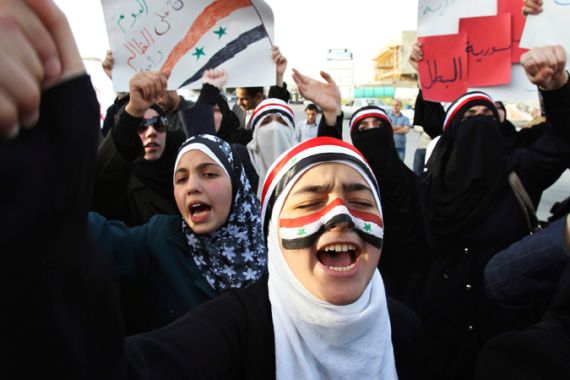Syrians hold ‘Great Friday’ protests
Protests come as activists demand an end to Baath Party monopoly on power and the establishment of a democratic system.

Thousands of people have reportedly taken to the streets in Damascus for rallies on what activists have dubbed “Great Friday”, hoping to see the largest protests in Syria to date against Bashar al-Assad, the president.
Rallies were also held in Daraa, Qamishli, and Hasakah.
The Reuters news agency quoted witnesses saying security forces used teargas to disperse protesters in the Damascus district of Midan.
A witness told Al Jazeera that demonstrators gathering at a mosque after prayers in Hasakah in the mainly Kurdish northeast were attacked by pro-government protesters.
Syrian activists co-ordinating mass protests against al-Assad’s rule have demanded the abolition of Baath Party monopoly on power and the establishment of a democratic political system.
In the first joint statement since protests erupted five weeks ago, the Local Co-ordination Committees, representing provinces across Syria, said “freedom and dignity slogans cannot be achieved except through peaceful democratic change”.
“All prisoners of conscience must be freed. The existing security apparatus has to be dismantled and replaced by one with with specific jurisdiction and which operates according to law,” said the joint statement.
Al Jazeera’s Cal Perry, reporting from the capital, Damascus, said protests were expected in over 40 cities across the country.
“The big question on everybody’s minds is: what will we see here in the capital. Last Friday people tried to march into the capital but they were turned back by tear gas.
“What we see now is that security forces are pre-empting protests by positioning themselves in the centre of towns like Homs and Daraa, so it will be difficult for the protesters to get to the centre of these towns when the security forces are already there.”
Witnesses said security forces were setting up checkpoints in areas surrounding Damascus, checking people’s ID cards.
 |
The demonstrations will test whether Assad’s decision to lift emergency law, imposed by his Baath Party when it took power in a coup 48 years ago, will defuse mass discontent with repression and corruption.
“We are determined on totally peaceful protests… we rejoice at the downfall of the state of emergency. It was not lifted, it was toppled… With the help of God, we will embark on freedom,” a comment on a Facebook page run by activists said.
Residents organised neighbourhood patrols after activists said 21 protesters were shot dead on Monday and Tuesday in Homs by security police and gunmen known as ‘al-shabbiha’.
Aided by his family and a pervasive security apparatus, Assad, 45, has absolute power in Syria.
More than 220 protesters have been killed since pro-democracy protests erupted on March 18 in the southern city of Daraa, rights campaigners say.
A decree Assad signed on Thursday that lifted emergency law is seen by the opposition as little more than symbolic, since other laws still give entrenched security forces wide powers.
Human Right Watch said Assad “has the opportunity to prove his intentions by allowing [Friday’s] protests to proceed without violent repression.
“The reforms will only be meaningful if Syria’s security services stop shooting, detaining, and torturing protesters,” Joe Stork, the group’s deputy Middle East director, said.
Army patrols
Soldiers in groups of five patrolled the streets of Homs overnight on foot. Plain-clothed security police and security police wearing camouflage uniforms were also present, two witnesses said.
Emergency rule has been used since Assad’s Baath Party seized power to justify arbitrary arrests and detention and a ban on all opposition.
Assad’s conciliatory move to lift the state of emergency followed a familiar pattern since the unrest began a month ago: pledges of reform are made before Friday when demonstrations are the strongest, and are usually followed by an intense crackdown.
The authorities have blamed armed groups, infiltrators and Sunni Muslim armed groups for provoking violence at demonstrations by firing on civilians and security forces.
Western and other Arab countries have mostly muted their criticism of the killings in Syria for fear of destabilising the country, which plays a strategic role in many of the conflicts in the Middle East.
Syria is technically at war with Israel but has kept its Golan Heights front quiet since a 1974 ceasefire.